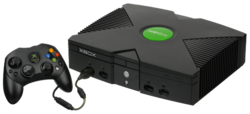| |
| Video games |
|---|

This is a list of video games for the Xbox video game console that have sold or shipped at least one million copies. The best-selling game on the Xbox is Halo 2 , first released in the United States on November 9, 2004. It went on to sell over 8.46 million copies worldwide. The first game in the series, Halo: Combat Evolved , was a launch title which ultimately became the second best-selling game, selling over 5 million copies.